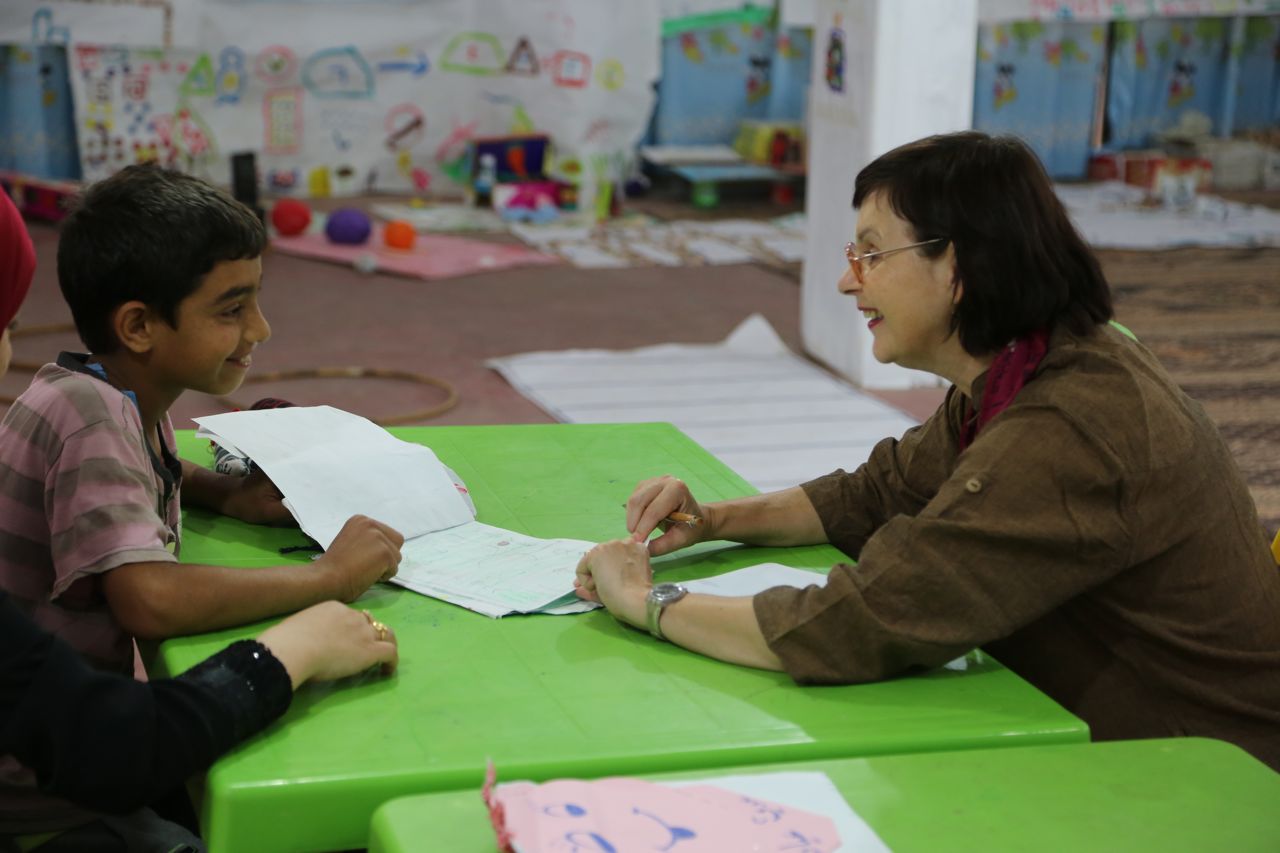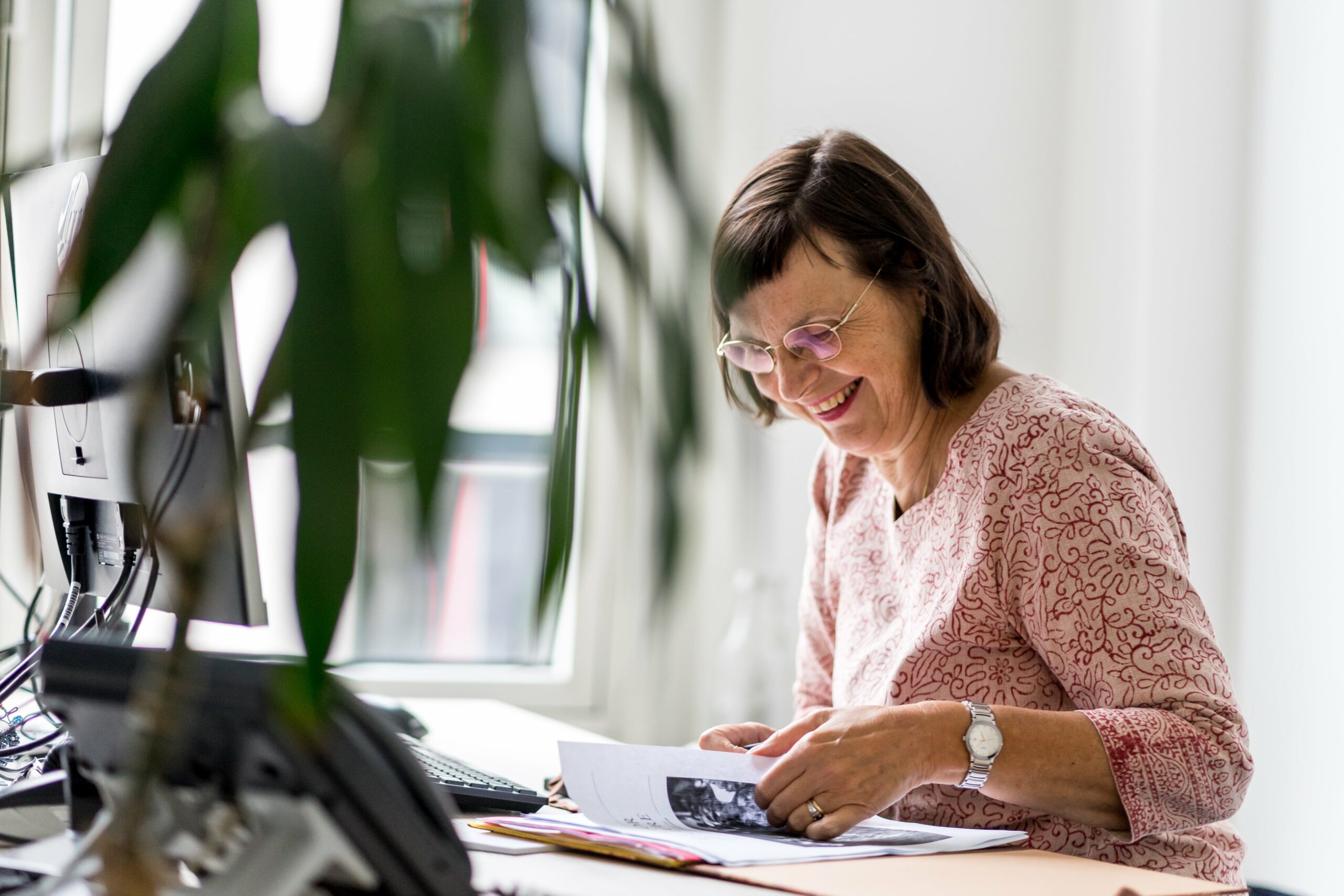For more than twenty years, she has worked in Kosovo, Chechnya and Syria. In refugee camps, hospitals or prisons. Whether it’s an area ravaged by conflict, natural disaster or poverty, as an emergency educationalist, Beatrice Rutishauser Ramm has worked in a variety of regions of the world struggling with crisis, not only training teachers but also accompanying them in their work with children, in some cases for many years. A thought-provoking discussion with an expert.
What kind of support do refugee children need right now?
A feeling of security and stability. And depending on the age of the child, that can mean quite different things. For example, more than anything else younger children need daily routines and lots of affection. As well as that, of course children need to play, in ways that are structured so they feel safe and secure, whether that’s because there’s an adult present or because they’re with a sibling. For the really little children, rituals are important, like reading them a bedtime story in the evening. It’s a good way to finish the day on a positive note.
This compares to children at an elementary school age, who start wanting to understand what’s happening and why. For them, we can offer a sense of security by explaining how some things depend on other things, in ways that match the age group. Not only does this allay fears, but it also allows them to feel they’re capable and able to do something themselves. The reason for this is that children at this age want to help, for example by making sure Mum or their siblings are all right. It’s important to ensure you don’t overburden children when they’re in a supportive role. If they behave differently, so maybe they suddenly start wetting their beds, it’s an indication that it’s becoming too much for them, so you have to work on this together.
When children start entering their teenage years, they worry a lot about the near
future. They wonder if they’ll be good enough for a new school, if they’ll make new friends, or where they’ll live. Kids need the right tools to allow them to navigate their way through all these new situations.
What actually is an emergency educationalist?
Emergency educationalists build bridges. They come into play whenever there’s a sudden and unforeseen situation and things start going wrong. So for example, we take care of things if there are no school books. Or we show teachers how to teach without books, particularly in places like refugee camps, because they don’t have ‘official’ schools. So we make sure children can continue learning, despite difficult circumstances. Emergency educationalists ensure that emphasis is given to the right teaching methods and that the content of teaching is based on the right processes.
What’s the difference between an everyday situation and an emergency?
Even if children find themselves in extremely stressful situations or they’ve had traumatic experiences, as a rule they still want to learn. But they don’t want to learn the same way as they do under normal circumstances. And you still have to achieve something. The problem you have is that traumatised children don’t want to look for answers. They suppress things; they don’t want memories to pop up about things they want to forget. This has a fundamental impact on learning. The usual way to deal with this is to work through things, on a practical level, rather than think through things. As emergency educationalists, we work alongside teachers to shed light on the situation children find themselves in and share learning techniques with them that children can actively use themselves.
How do emergency educationalists work with children?
Definitely one of the most important things is to establish a secure framework for children. This provides a setting for positive experiences with others and mainly involves physical activity to lighten the load on the nervous system. And activities are organised to allow children to express themselves. The conversations we have with the children take place in such a way that they don’t actually have to answer questions. So they decide for themselves what they want to say, or whether they want to say anything at all. You have to allow the children to join the conversation with the educationalists as if they’re going on a walk in their thoughts, so they can make new connections.

One tried and trusted approach in such situations in life is to use fairy tales, as the images often reflect the situation of loss and fear you’ve experienced yourself, either good or bad, in a way that’s easy to grasp. And a really important point is that at the end of the story, good always prevails. We also show children how learning aids can be used to get back in touch with the things they lost because of the trauma they experienced – whether that be maths or a foreign language.
What kind of help do they need after receiving emergency support?
During the second phase, children start to process what’s happened on a much more conscious level. This will happen sooner or later, depending on how old they are. What’s important at this point is that they’re accompanied, so they acquire strategies for coping with the new challenges they face. So now teachers have to rely on the inherent curiosity of children and arouse the innate satisfaction they derive from learning. It can be quite challenging, all the more so when – as is so often the case – you have to do it in a language they haven’t learnt yet.
It’s only when you get to the third phase that you start helping children regain their sense of self-esteem and resilience, and help them take control of their lives again.
What’s the goal for the EduCare Europe Fund?
Lots of the partners we work with are overwhelmed at the moment; they feel they’re on their own having to deal with children from areas in crisis. They can sense that the things the children have experienced need a different answer than ‘it’s time for the child to go back to school again’. The task now is about integration and this always affects the overall class and the overall school community.
It’s not something schools can deal with by themselves. The children need a different place, away from the classroom, a place of retreat, a place they can enjoy themselves without worrying about being overwhelmed, so they can become strong. If you connect these places to the schools, that also makes it possible to offer language lessons, or work with parents, or run other programmes related to things going on at the school.
We have the right know-how to conduct this kind of integration work and train nursery staff and teachers. The PATRIZIA Foundation is working with a number of partner organisations to do this.
Personally, I’m more specialised in the pedagogical aspects, but this makes us a good team and we can make our experience available for training courses. I say this because we mustn’t forget that integrating children from areas of crisis is a gargantuan task, quite simply because it affects so many children.
Interview conducted by Andreas Menke.
Beatrice Rutishauser Ramm
Beatrice Rutishauser Ramm is a trained educationalist with a master’s degree in Global Education. After ten years of teaching in the classroom, she worked as an emergency educationalist for Caritas Switzerland for nearly twenty years. The international projects she has worked on were affected by both chronic and acute crises. In early 2020, she started working as an independent consultant on emergency education topics. As part of her work for Caritas Switzerland, she developed the Essence of Learning (EoL) method, an adaptable approach that supports children with their learning requirements – in any kind of crisis. EoL is used in a variety of programmes aimed at different age groups, both inside and outside the school environment. In 2017, the EoL method was selected and funded by UNHCR for the Humanitarian Educational Accelerator (HEA) programme. Since September 2020, Ramm has been offering her expertise as an educationalist to the PATRIZIA Foundation. Her podcast series, We are in this together, was ranked in the Top 3 for the mEducation Alliance Awards 2021 in the category of Crisis and Conflict Response.

